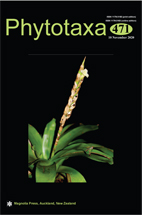Abstract
Changes to the taxonomy of Quercus section Lobatae subsection Racemiflorae occurring in western Mexico are here made to reflect new evidence regarding species relationships of two lineages occurring in the southern Sierra Madre Occidental. The name Q. pennivenia is resurrected to recognize plants previously included under the name Q. urbanii. A new taxon, Q. huicholensis, is described to represent a distinct lineage segregated from Q. conzattii. With these nomenclatural changes we recognize the subsection Racemiflorae to consist of six taxa and we provide a key for their determination.
References
<p class="Reference">Bacon, J.R. & Spellenberg, R. (1996) Hybridization in two distantly related Mexican black oaks <em>Quercus conzattii</em> and <em>Quercus eduardii</em> (Fagales: <em>Quercus</em>: section <em>Lobatae</em>). <em>Sida</em> 17: 17–41.</p><p class="Reference">Camus, A. (1952–54) Les chênes. Monographie de genre <em>Quercus</em>. Tome III. Genre <em>Quercus</em>, sous-genre <em>Euquercus</em> (sections <em>Protobalanus </em>et <em>Erythrobalanus</em>). <em>In: </em>Lechavalier, P. (Ed.) <em>Monographie de genre Lithocarpus et addenda aux tommes</em> I, II, III., Paris.</p><p class="Reference">Carrière, É.A. (1854) <em>Thuia gigantea</em> et autres Conifères de la Californie et de Mexique septentrional. <em>Revue Horticole (Paris)</em> Ser. 4: 3: 223–229.</p><p class="Reference">González-Elizondo, M.S., González-Elizondo, M. & Sørensen, P.D. (2012) <em>Arbutus bicolor</em> (Ericaceae, Arbuteae), a new species from Mexico. <em>Acta Botánica Mexicana</em> 99: 55–72.</p><p class="Reference"> <a href="https://doi.org/10.21829/abm99.2012.19">https://doi.org/10.21829/abm99.2012.19</a></p><p class="Reference">Gray, A. (1886) <em>Synoptical Flora of North America: the Gamopetalæ, being a second edition of vol. I, part II, and vol. II, part I, collected</em>. Iverson, Blakeman, Taylor, and Company, New York, 494 pp.</p><p class="Reference"> <a href="https://doi.org/10.5962/bhl.title.57429">https://doi.org/10.5962/bhl.title.57429</a></p><p class="Reference">Hipp, A.L., Manos, P.S., Hahn, M., Avishai, M., Bodénès, C., Cavender-Bares, J., Crowl, A., Deng, M., Denk T., Fitz-Gibbon, S., Gailing, O., González-Elizondo, M.S., González-Rodríguez, A., Grimm, G.W., Jiang, X-L., Kremer, A., Lesur, I., McVay, J.D., Plomion, C., Rodríguez-Correa, H., Schulze, E-D., Simeone, M.C., Sork, V.L. & Valencia-Avalos, S. (2020) Genomic landscape of the global oak phylogeny. <em>New Phytologist</em> 226: 1198–1212.</p><p class="Reference"> <a href="https://doi.org/10.1111/nph.16162">https://doi.org/10.1111/nph.16162</a></p><p class="Reference">Humboldt, F.W.H.A. von & Bonpland, A.J.A. (1809) <em>Plantes eìquinoxiales recueillies au Mexique: dans l’île de Cuba, dans les provinces de Caracas, de Cumana et de Barcelone, aux Andes de la Nouvelle Grenade, de Quito et du Peìrou, et sur les bords du rio-Negro de Oreìnoque et de la rivieÌre des Amazones</em>, 2. Lutetiae Parisiorum: Apud F. Schoell, Bibliopolam Tubingæ Apud J.G. Cotta, 191 pp.</p><p class="Reference"> <a href="https://doi.org/10.5962/bhl.title.460">https://doi.org/10.5962/bhl.title.460</a></p><p class="Reference">Humboldt, F.W.H.A. von, Bonpland, A.J.A. & Kunth, K.S. (1818) <em>Nova Genera et Species Plantarum</em> (quarto ed.) 3. Lutetiae Parisiorum: Sumtibus Librairie Graeco-Latino-Germanicae, 456 pp.</p><p class="Reference"> <a href="https://doi.org/10.5962/bhl.title.640">https://doi.org/10.5962/bhl.title.640</a></p><p class="Reference">Jacquin, N.J. (1760) <em>Enumeratio systematica plantarumquas in insulis Caribaeis vicinaque Americes continente detexit nouas, aut iam cognitas emandauit</em>. Apud Theodorum Haak, Lugduni Batavorum, Leiden, 41 pp.</p><p class="Reference"> <a href="https://doi.org/10.5962/bhl.title.737">https://doi.org/10.5962/bhl.title.737</a></p><p class="Reference">Liebmann, F.M. (1854) Om Egeslaegten i America. <em>In:</em> Johan, M.C. (Ed.) <em>Oversigt over det kongelige danske videnskabernes selskabs forhandlinger og dets medlemmers arbeider. </em>Kjobenhavn, Copenhagen, pp. 159–189.</p><p class="Reference">Lindley, J. (1845) <em>Disocactus biformis</em>. <em>Edwards‘s Botanical Register</em> 31: t. 9.</p><p class="Reference">Linnaeus, C. von (1753) <em>Species Plantarum</em>, Impensis Laurentii Salvii, Holmiae, 1231 pp.</p><p class="Reference"> <a href="https://doi.org/10.5962/bhl.title.669">https://doi.org/10.5962/bhl.title.669</a></p><p class="Reference">Linnaeus, C. von (1762<em>) Species Plantarum</em>, Editio Secunda, Vol 1, Impensis Laurentii Salvii, Holmiae, 784 pp.</p><p class="Reference"> <a href="https://doi.org/10.5962/bhl.title.11179">https://doi.org/10.5962/bhl.title.11179</a></p><p class="Reference">Loesener, T. (1900) Bieträge zur Kenntnis der Flora von Central-Amerika (einschlieſslich Mexico). II. <em>Botanische Jahrbücher für Systematik, Pflanzengeschichte und Pflanzengeographie</em> 29: 86–106.</p><p class="Reference">Loudon, J.C. (1830) <em>Hortus Britannicus</em>. Longman, Rees, Orme, Brown and Green, London, 576 pp.</p><p class="Reference">Martínez, M. (1966) Los encinos de México. XIV. <em>Anales del Instituto de Biología de la Universidad Nacional de México</em> 37: 81–95.</p><p class="Reference">McCauley, R.A., Cortés-Palomec, A.C. & Oyama, K. (2019) Species diversification in a lineage of Mexican red oak (<em>Quercus</em> section <em>Lobatae</em> subsection <em>Racemiflorae</em>)–the interplay between distance, habitat, and hybridization. <em>Tree Genetics and Genomes</em> 15: 27.</p><p class="Reference"> <a href="https://doi.org/10.1007/s11295-019-1333-x">https://doi.org/10.1007/s11295-019-1333-x</a></p><p class="Reference">McVaugh, R. (1974) Fagaceae. Flora Novo-Galiciana. <em>Contributions from the University of Michigan Herbarium</em> 12 (pt.1, no. 3): 1–93.</p><p class="Reference">Miller, P. (1754) <em>The Gardeners Dictionary</em>, abridged ed. 4. London.</p><p class="Reference">Née, L. (1801) Descripción de varias especies nuevas de Encina (<em>Quercus</em> de Linneo). <em>Anales de Ciencias Naturales</em> 3: 260–278.</p><p class="Reference">Robinson, B.L. & Fernald, M.L. (1895) New plants collected by Messrs. C.V. Hartman and C.E. Lloyd upon an archæological expedition to northwestern Mexico under the direction of Dr. Carl Lumholtz. <em>Proceedings of the American Academy of Arts and Sciences</em> 30: 114–123.</p><p class="Reference"> <a href="https://doi.org/10.2307/20020584">https://doi.org/10.2307/20020584</a></p><p class="Reference">Sargent, C.S. (1891) <em>New or Little-known plants</em>. Garden and Forest 4: 317.</p><p class="Reference">Schlechtendal, D.F.L. & Chamisso, L.K.A. (1830) Plantarum Mexicanarum a cel. viris Schiede et Deppe collectarum recension brevis. <em>Linnaea; Ein Journal für die Botanik in ihrem ganzen Umfange </em>5: 72–200.</p><p class="Reference">Schlechtendal, D.F.L. & Chamisso, L.K.A. (1831) Plantarum Mexicanarum a cel. viris Schiede et Deppe collectarum recension brevis. <em>Linnaea; Ein Journal für die Botanik in ihrem ganzen Umfange </em>6: 352–384.</p><p class="Reference">Spellenberg, R. & Bacon, J.R. (1996) Taxonomy and distribution of a natural group of black oaks of Mexico (<em>Quercus</em>, section <em>Lobatae</em>, subsection <em>Racemiflorae</em>). <em>Systematic Botany </em>21: 85–99.</p><p class="Reference"> <a href="http://doi.org/10.2307/2419565">http://doi.org/10.2307/2419565</a></p><p class="Reference">Spellenberg R., Bacon, J.R. & Breedlove, D.E. (1995) A new species of <em>Quercus </em>(Fagaceae, sect. <em>Lobatae</em>, group<em> Racemiflorae</em>) from the Sierra Madre Occidental Mexico. <em>Madroño </em>42: 26–33.</p><p class="Reference">Trelease, W. (1921) A natural group of unusual black oaks. <em>Proceedings of the American Philosophical Society</em> 60: 31–33 + 3 plates.</p><p class="Reference">Trelease, W. (1924) The American Oaks. <em>Memoirs of the National Academy of Sciences</em> 20: 1–255 + 420 plates.</p><p class="Reference"> <a href="https://doi.org/10.5962/bhl.title.142965">https://doi.org/10.5962/bhl.title.142965</a></p><p class="Reference">Zuccarini, J.G. (1832) Plantarum novarum vel minus cognitarum, quae in horto botanico herbarioque region monacensi servantur, fasciculus primus. <em>Abhandlungen der Mathematisch-Physikalischen Classe der Königlich Bayerischen Akademie der Wissenschaften</em> 1: 289–394.</p><p class="Reference"> <a href="https://doi.org/10.5962/bhl.title.9506">https://doi.org/10.5962/bhl.title.9506</a></p><p>Zuccarini, J.G. (1838)<em> </em>Ueber eine neue Gattung aus der Familie der Bromeliaceae nebst Bemerfungen über einige mexikanische Agaven. <em>Allgemeine Gartenzeitung</em> 6: 257–259.</p>

